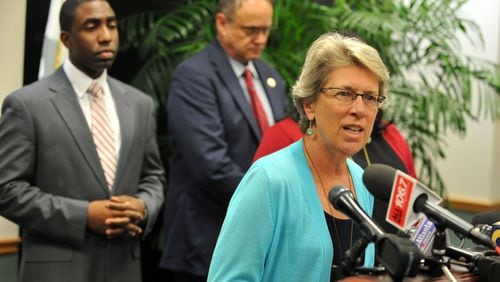DeKalb initiatives approved by the Georgia General Assembly
- An independent auditor position will be created to expose fraud, find inefficiencies and improve government transparency.
- The DeKalb Board of Ethics will be reappointed, with community groups choosing board members instead of county politicians. The legislation also removes the board's power to remove elected officials from office. The Board of Ethics will be picked by the DeKalb Bar Association, the DeKalb Chamber of Commerce, the DeKalb legislative delegation, the judge of the DeKalb Probate Court, Leadership DeKalb, DeKalb colleges and universities, and the chief judge of DeKalb Superior Court.
- Sealed bids will be required for all DeKalb government purchases exceeding $50,000, and the DeKalb Commission must approve all purchases exceeding $100,000.
About the internal auditor
A watchdog over DeKalb’s government will be required by state law after Gov. Nathan Deal signs House Bill 599, which was approved by the Georgia General Assembly last month.
The independent internal auditor will have the authority to expose government fraud, inefficiencies and waste. The auditor’s findings and recommendations will be released in public reports that are intended to improve transparency and improve operations. Enacting the recommendations will be the responsibility of the DeKalb Commission and the county’s administration.
The auditor will be independent from the rest of the county’s government. A five-person audit oversight committee will be selected by the end of October and choose candidates for the job. The auditor must be a certified public accountant or certified internal auditor and have at least five years of experience in government auditing, evaluation and analysis.
With corruption scandals in DeKalb County making headlines, a group of concerned citizens gathered in a library last year to talk about what they could do.
They discussed the need for independent oversight of county operations. They wanted stronger ethics rules. They sought tighter controls on the spending of taxpayer money. Before long, the group brought together by Commissioner Kathie Gannon gained support from other residents, as well as elected officials and business leaders.
Their efforts paid off in the recent legislative session. State lawmakers passed bills last month that create a new position for a financial watchdog, reorganize the DeKalb Board of Ethics and institute stricter county purchasing rules.
“If the general citizenry hadn’t put pressure on their elected officials to do something, we know it couldn’t have happened,” said Gil Turman, a retired high school principal and a leader of the Blueprint DeKalb group that pushed for changes. “We had to come together to put things in place to make corrections to the wrongs that are taking place in this county.”
Blueprint DeKalb drew residents from across the county to the Decatur Library when it first met in February 2014. Residents broke into groups to focus on areas where they believed the county needed improvements. Then they did research and wrote position papers on each topic over the next few months.
Their proposals later received support from another group, the DeKalb Operations Task Force, organized last summer by Interim DeKalb CEO Lee May to assess the effectiveness of county government.
During this year’s legislative session, residents sent hundreds of emails and letters to state lawmakers, and DeKalb’s delegation won approval of the measures from the full House and Senate. The bills are now awaiting Gov. Nathan Deal’s signature.
“Never underestimate the power of a small group of concerned citizens to make a difference, because they can,” said Martha Pacini, a member of Blueprint DeKalb’s leadership team. “It’s one of those strange moments in history when all roads converge.”
The financial watchdog position, called an independent internal auditor, will be responsible for finding fraud and improving government efficiency. The DeKalb Commission had debated creating an auditor’s job for years.
Now state law will require outside oversight. Supporters of the auditor position hope it will help find and prevent misbehavior before it becomes a criminal matter.
DeKalb County has been plagued for years with allegations of corruption.
Two years ago, a special grand jury investigation led to charges being filed against DeKalb CEO Burrell Ellis, who is accused of illegally pressuring county contractors for campaign contributions. He is set to be back in court for a second time June 1 after jurors couldn't reach a decision in his first trial.
Also former DeKalb Commissioner Elaine Boyer was sentenced last month to serve 14 months in prison for swindling taxpayers out of more than $100,000 and funneling much of that money back to herself; a former county zoning board of appeals member pleaded guilty in February to taking $3,500 in bribes; and a former county janitorial services manager pleaded guilty this month to using his position to steer public funds to a company that was bribing him.
About half of the counties in the United States with populations comparable to DeKalb, which has more than 700,000 residents, already have internal auditors, according to the Association of Local Government Auditors. In metro Atlanta, internal auditors can be found in Cobb County, Fulton County and the city of Atlanta.
DeKalb’s internal auditor will be modeled in part on Atlanta’s. The Atlanta auditor’s office has published more than 100 reports since it began operations in 2001. About 70 percent of the office’s recommendations have been implemented.
“Audits will often find risks and indicators that could suggest fraud, abuse, corruption or ethics issues,” said Atlanta City Auditor Leslie Ward. “People accept that we’re here and we’re not going away. For the most part, we get good cooperation when we go into departments.”
The auditor position will begin the process of restoring public trust in county government, Gannon said.
“The auditor can be a watchdog so there’s less temptation to do things inappropriately,” she said. “There’s a lack of accountability in the everyday management of projects and programs in DeKalb.”
Sen. Elena Parent, D-Atlanta, said full-time scrutiny of county government will bring about transparency and accountability.
“This legislation gives confidence to DeKalb County residents that their taxpayer money is being spent appropriately and in an ethical manner,” said Parent, who served on the Operations Task Force and helped get the position approved by the Georgia General Assembly.
The auditor’s office will be independent from the DeKalb Commission and the county’s chief executive, according to House Bill 599. A five-member audit oversight committee will submit two or three candidates for the auditor job to commissioners. If they don’t make an appointment from those candidates within 30 days, the oversight committee can seat the auditor by a majority vote.
Though the auditor’s office won’t have the power to force changes in county government, it will have unrestricted access to employees and information, and publish reports with recommendations.







